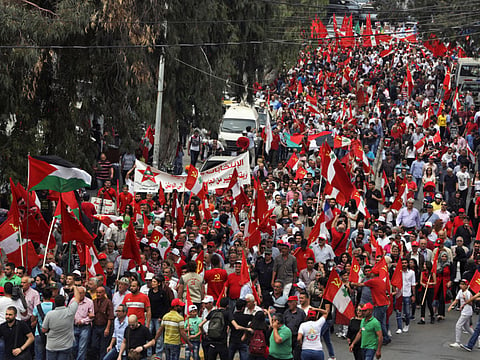Lebanese vent frustrations over strained economy
Thousands take to the streets to express that their hope for a decent life has dwindled

Beirut: Thousands of protesters marked Labour Day on Monday as labour union leaders vented their anger against authorities who struggle to deliver on promises of pay rises.
The demonstration coincided with the recent anger over the government’s decision to delay the long-awaited salary rises for teachers, civil servants and the military.
On Sunday, the National Federation of Workers’ and Employees’ Trade Unions (FENASOL) and the Domestic Workers’ Union in Lebanon (DWUL) held a pre-protest to express anger over the delays and also organised Monday’s rally near its headquarters at the Cola Roundabout, led by Castro Abdullah, the organisation’s chairman.
Abdullah declared that, “May 1st [2017] comes carrying with it more tragedies and crises that make joy and hope for a decent life something very far-fetched for the working class”.
The Lebanese Communist Party added its voice to the Monday rally, while tenants upset with the government’s latest proposals to increase fixed rents, rallied in Beirut’s Ashrafieh neighbourhood.
Ahead of the demonstrations, Prime Minister Sa‘ad Hariri marked Labour Day with an assurance that the Lebanese government was ready to tackle all challenges and already began implementing a series of measures to reduce competition for the Lebanese labour market.
Hariri clarified that authorities were working to alleviate the suffering faced by workers, and said various measures to reduce “competition for the Lebanese labour force, actuating the economic cycle and encouraging investments to increase employment opportunities” were already being implemented.
The premier reiterated his pledge to present the proposed wage scale to the parliament as soon as possible while pointing out the realities of the market being flooded by cheap Syrian manpower — one of the many repercussions of the six-year Syrian civil war next door. Hariri reiterated that the influx of Syrian workers deprived Lebanese of jobs — many who are in serious economic need.
He pointed out that the refugees were also placing a huge strain on public services.
However, he assured the public that Lebanese workers remained the “pillar” of the general production cycle.
Last month Hariri sounded the alarm that Lebanon was close to “breaking point” due to the strains of hosting 1.5 million Syrian refugees, and he feared unrest could spiral from tensions between them and Lebanese communities.
Refugees make up a quarter of Lebanon’s population, and most live in severe poverty in makeshift camps across the country as the government opposes the creation of formal ones.
The Syria war has weakened Lebanon’s economy, fuelled tension among Lebanese allied to the rival sides, and triggered a number of terrorist attacks. But there has so far been no significant violence between Syrian refugees and Lebanese host communities.
Hariri urged the international community to commit to spending the equivalent of $10 to 12,000 per refugee over a period of five to seven years, compared to the current level of foreign support equivalent to $1 to 1,200 per year.
Lebanese officials, citing World Bank figures, say the cumulative cost of the Syrian conflict to Lebanon was $18.15 billion to the end of 2015.
Lebanon’s annual economic growth has slowed to just over one per cent from an average of 8 per cent before the Syrian war, officials have said.
The government is seeking financial support for a programme of public sector-led investment in infrastructure to boost the economy, and to increase the number of Syrians in education.



